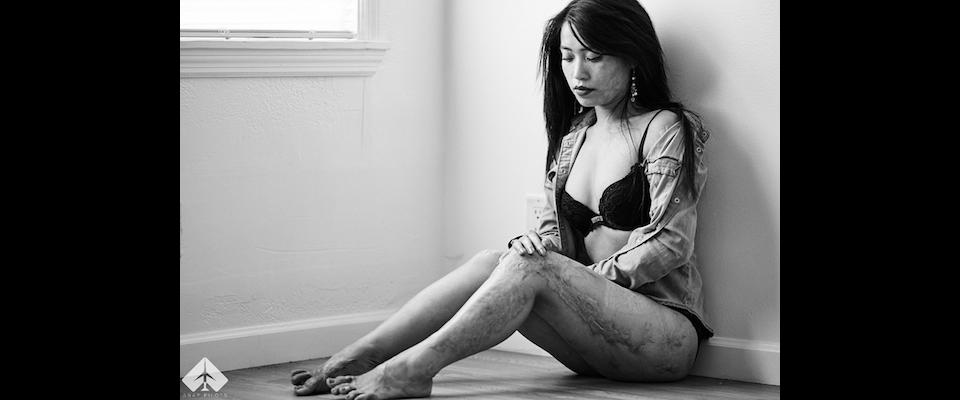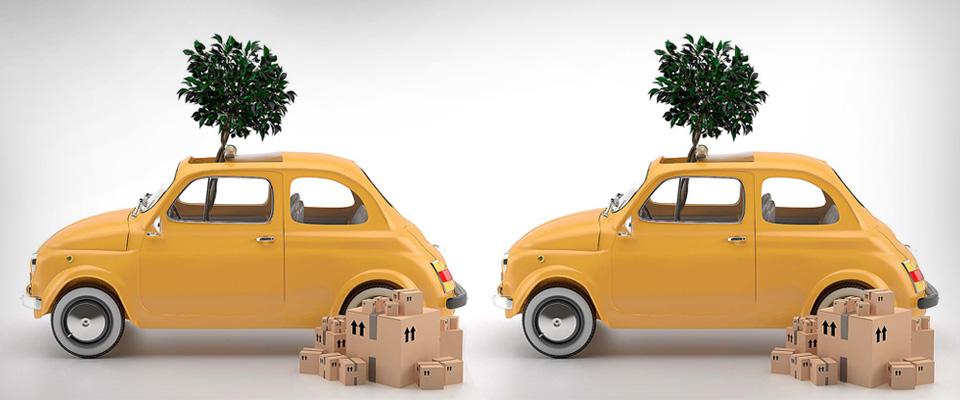Kiki Vo and two of her four sisters scurried down the dirt road leading from their family’s hut in Hiep Thanh, Vietnam, a flickering kerosene lamp lighting the way past sleeping chickens. The sisters were on a mission to smuggle some late-night candy from their mother’s shop after a day of studying. They whispered about the possibility of rain the next day, imagining they could shed their clothes and run wild in the downpour.
But as they approached the shop they spotted their mother pouring gasoline into a bottle for their father’s motorcycle trip the next day. Kiki’s younger sister rested her lamp as she crouched to observe—failing to register the danger of placing fire so close to gasoline. With the fierce whir of combustion, the gasoline lit into flames around them. Kiki and her sisters ran into the back of the hut. Their mother yelled to them to get out. The girls huddled deeper into the smoky corner, paralyzed by fear, as their mother tried to shield them with her body. But the fire reached them all, skin and bones melting under a smoky, crackling curtain before their father could pull them out.

Huyen Vo, now known as Kiki, was 9 years old when she suffered third-degree burns on 85 percent of her body. But her story didn’t end there. She moved to the United States, underwent 10 years of surgeries, earned a degree in social welfare from UC Berkeley, and has begun working as an elementary school site coordinator for an after-school program through Bay Area Community Resources.
Today her scarred torso bears the tattoo of a soaring phoenix, the mythical bird a visible reminder of the strength she strives to pull from the ashes of the past. Recently, in a bold attempt to aid the internal struggle for self-confidence faced by other people with scarring, she accepted an offer to pose in a “Beauty Beyond Scars” photo shoot with friend and former Cal student Krysada Binly Phounsiri. Posing in a bra and shorts, Kiki sought to demonstrate her sexuality not despite her scars, but with them.
Now, when she speaks of the past, she refers to the fire as her “rebirth.” And she is pledging to use her unique experiences to encourage others with scars or deformities to embrace life to its fullest.
One recent night, after concluding her two-hour commute home to the East Bay town of Emeryville, Kiki tucked her feet into the cushions of her couch and began reflecting on what life has taught her about perseverance. But first she recounted having just witnessed a man trying to shoplift at Safeway, and tears stung her eyes as she wondered about his living conditions, why he would steal food, and how thankful she now was to be able to feed herself. And then her mind goes further back in time.
Much of Kiki’s story is dependent on her memory, admittedly shaped by severe trauma at a young age. She recalls moments from the fire in precise bursts of horror, and then its arduous aftermath: how her father scraped together enough money for the burn care his three daughters first received in a Vietnamese hospital, and how her mother did not survive.
She remembers the room where doctors tied her and her sisters’ limbs to the bedposts to keep them from thrashing in pain, and attempted to mollify their cries. “When we went to get washed we didn’t have pain meds,” she says, “and we would scream and the tub would fill with blood.” Eventually, she grew too tired to cry.

“I spent two years after the burn in Vietnam, and it was very fresh. The first year was horrible because you were itchy everywhere but you can’t scratch it. We had wooden beds with mosquito nets and my dad would stay up all night making sure we were OK.”
Much of her extended family in Vietnam concluded that children deformed in such a way had little, if any, worth. “They were saying we would be disabled for the rest of our lives and no one would want to marry us,” she says, adding that relatives warned that they would have no choice but to spend the rest of their lives on the street, begging for food.
Kiki’s father didn’t agree.
Then a woman representing a nonprofit learned about the family’s plight through an article in a Vietnamese newspaper. The woman and her nonprofit were not affiliated with the Shriners, but she offered to bring the burned children and their father to the United States for treatment at Shriners Hospital for Children in Boston, a center that provides medical care regardless of a family’s ability to pay. The nonprofit would provide transportation and housing so the children could receive American health care—so the Vo family embraced the opportunity and headed for Boston, leaving the two remaining sisters in their grandparents’ care.
Kiki remembers meager living conditions, living in a small basement storage room shared with a boiler, one bed and no heat in the harsh Boston winter—not to mention feeling used as poster child for fundraising by the organization that arranged their passage to the United States. The Shriners, on the other hand, changed her life. Surgeries enabled her to use her hand once again and transformed her burned body over the course of 10 years. “I didn’t finish my treatments until I was 21,” she explains.
The family’s visas were up before the surgeries were finished, so Kiki’s dad moved them to Sacramento where he hoped they could avoid deportation and conclude their treatments at a different Shriners center. He also managed to bring Kiki’s other sisters across the Pacific. Throughout middle and elementary school, she tried to be “as invisible as possible,” knowing the other kids were put off by her appearance. “They wouldn’t sit near me or talk to me,” she says. “It was more of a passive bullying sort of thing. A lot of times I internalized those things. I started to have a lot of hate for everything.”
Her father worked endless odd jobs to support his family and provide the $10 he gave her before school each day to buy dinner supplies for their six-person household. He didn’t have time to offer the affection she needed.
Burn camps each summer, such as Firefighter Kids Camp and the Alisa Ann Ruch Champ Camp, helped Kiki feel a sense of community, but the summers were short and the school year dragged on. During her junior year of high school, Kiki attempted to overdose on some pills and end her life.
When she woke up in the hospital, she found her father crying.
“I didn’t realize the way he cared about me,” Kiki says. “I snapped back. I had never seen him cry before, and I realized how selfish I was, and how hard everything was on him…. I started to refuse the cycle of self hate.”
Within a year, her father’s body started to fail from Hepatitis B and liver cancer. “He started telling me where the money safe and things like that were,” and she realized she soon was going to be the one in charge. His last wish: His daughters would support one another and complete their educations. Kiki studied for her SATs on her father’s hospital bed.

After his death, Kiki’s younger sisters were adopted by a firefighter couple whom Kiki continues to regard as “guardian angels.”
Encouraged by mentors such as Fong Tran, a Cal social welfare graduate, Kiki applied and gained admission to UC Berkeley. “When I met her, she was in the middle of losing her father to cancer,” says Tran, who met her while he was a youth specialist at Asian Resources. “I was there as a confidant for emotional support and as a guide through all that chaos.”
He calls her life story phenomenal. “To see such a young lady go through so many issues, from being a burn survivor, to someone that lost both her parents, to being the oldest in her family. Take any part of that and you’re an incredible person for being able to go to Berkeley and having a career and persisting. But to have all of them, overlapping and intermingled and intersectional – that’s pretty extraordinary. And she’s still facing all those issues.”
For Kiki, Cal was a different—and more accepting—world. Many of her peers looked beyond the scars, the epidermal evidence of turmoil, and saw her for who she was.
“At UC Berkeley, I met many incredible individuals who helped me realize that my own beauty stretches beyond my physical appearance,” she has observed. “Rather, what makes me uniquely beautiful was my strength to continue on with life despite all the pain and losses I encountered. By surrounding myself with positive, supportive, and loving individuals, I came to truly embrace the notion that it is perfectly normal to have physical flaws. I’m human; everyone has some form of flaws or scars, whether it is visible or invisible. Once I made that choice to accept myself holistically, I was able to focus on my academic growth and finding ways to advocate for my burn community. Thus during Fall 2012, I had a moment of self-reflection. I realized that I was not just a Cal student but also a burn survivor in higher education; that was something I should not take for granted.”
She began studying the impact of physical deformation on women’s sexual intimacy, and consequently their sense of self-worth. This led her to write a research paper investigating this topic with first-hand accounts from women she knew who also lived with visible scars.
Then her friend Phounsiri, a photographer, suggested the photo shoot.
“I met Kiki a couple of years back,” Phounsiri wrote. “She is a powerful individual with a powerful story to share. Her resilience in breaking down normative standards of beauty is as physically present as it is emotionally.”

“I couldn’t sleep the whole night before the shoot,” Kiki says, recalling that everything about the concept was exhilarating and terrifying, but that she told herself, “I want to do something every year that pushes myself to the edge.” In high school, she had worn her first short-sleeved shirt; at age 24, her first bikini. Agreeing to the posting of these pictures on the Internet was the next big step.
Her ultimate goal is to work as a mental health counselor for trauma patients in burn hospitals, perhaps a Shriners center. “I want to be a social, emotional educator. Not just in my job, but in everything I do…. People often see emotions as a sign of weakness. But there’s no way to grow if you don’t share your story.
“At first I hated the way everything happened and everything I had to do,” she continues. “But if it wasn’t for the fire, I wouldn’t be here, getting an education. I wouldn’t take it back. Even if it meant for me to have my mom and dad back again. When I accepted that, everything was different. I don’t miss them in the sense that I wish to have them in my life again. I feel they have done their work, their duty. They left five girls in this world for a reason. To create a legacy. I truly believe the fire happened for a reason. It allowed me to be new and fresh again. To create my own identity. To be someone unique, to have the power to create change. And that’s a really big part of me.
“When I have the opportunity to do something right, share my story, help someone, my fire is lit. It’s my sense of purpose.”
“Beauty Beyond Scars” photos courtesy of Krysada Binly Phounsiri




















